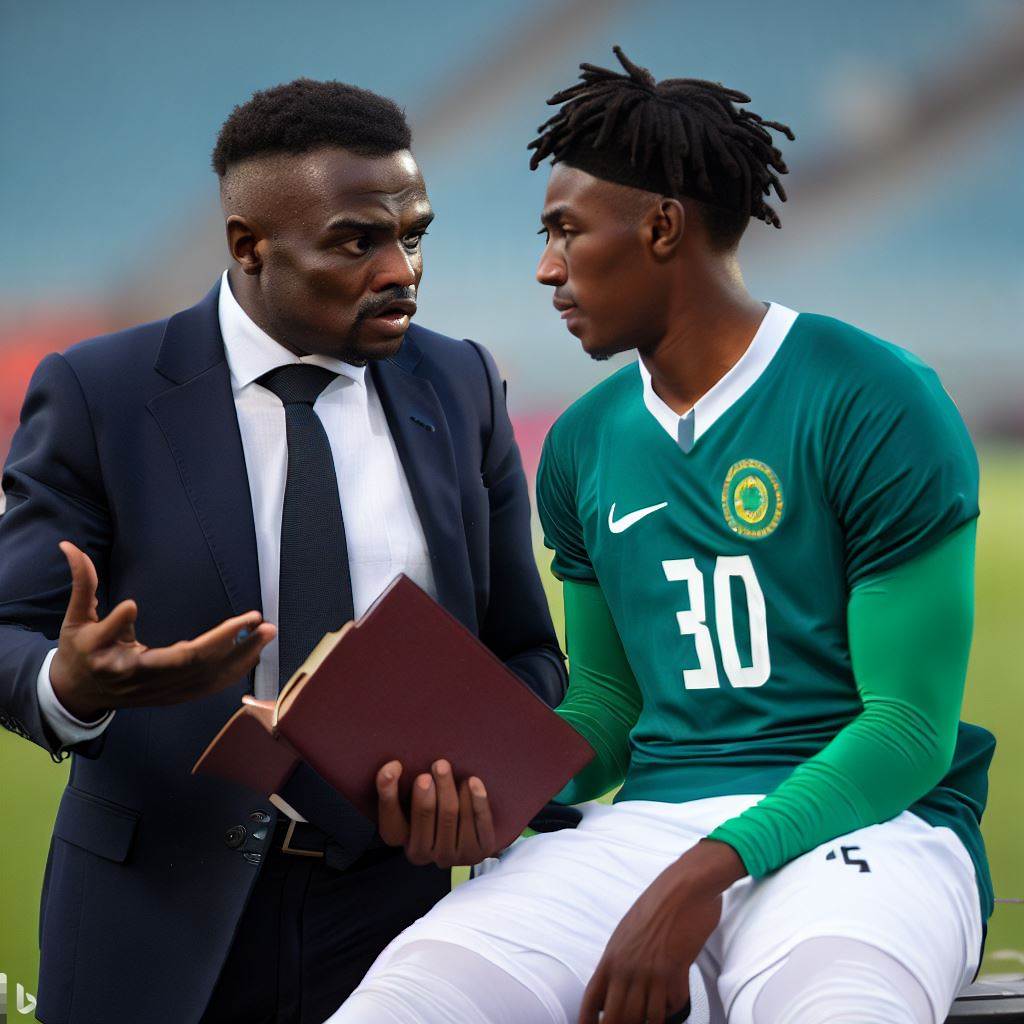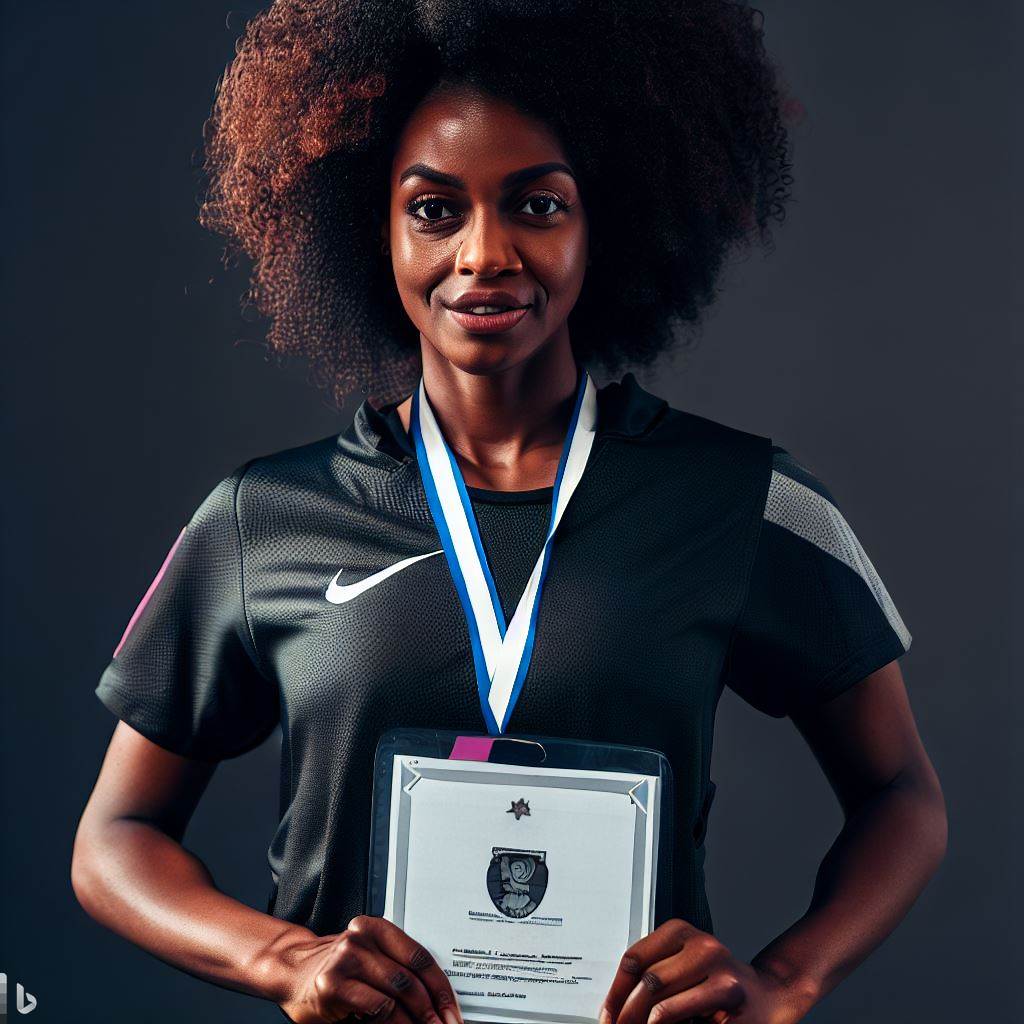Introduction
Assistant coaching in Nigeria involves multifaceted legal considerations.
Understanding these aspects is crucial for coaches, institutions, and athletes.
Thesis
This article explores Nigerian assistant coaching’s legal dimensions, offering insights for effective navigation.
Navigating Nigerian Assistant Coaching: Unveiling Legal Insights
Assistant coaching in Nigeria is a dynamic and rewarding profession, but it comes with a web of legal intricacies.
To excel in this field, it’s vital to comprehend and adhere to the legal aspects that govern it.
In this article, we’ll delve into the legal dimensions that assistant coaches must consider in Nigeria, shedding light on how to navigate them effectively.
Whether you’re a seasoned coach or just starting your journey, these legal aspects will impact your career.
From contractual agreements and liability issues to athlete welfare and regulatory compliance, we’ll explore every facet of the legal landscape.
So, let’s embark on this journey to unravel the legal intricacies of assistant coaching in Nigeria and equip you with the knowledge to succeed.
Role and Responsibilities of Assistant Coaches in Nigeria
The role of an assistant coach
- An assistant coach is an individual who provides support and assistance to the head coach.
- They work closely with the head coach to develop training strategies and game plans.
- Assistant coaches also play a crucial role in mentoring and guiding the players.
Specific responsibilities and duties of assistant coaches in Nigeria
- Assistant coaches are responsible for scouting and analyzing opponents’ strategies and tactics.
- They assist in conducting training sessions, focusing on specific skills development and improvement.
- Assistant coaches provide individualized feedback and guidance to players.
- They assist in creating game plans and making tactical adjustments during matches.
- Assistant coaches collaborate with the head coach and other staff members to develop a cohesive team.
- They are responsible for keeping track of player performance and progress.
- Assistant coaches also ensure discipline and adherence to team rules and regulations.
- They contribute to the overall development of players’ mental and physical well-being.
- Assistant coaches play a vital role in fostering a positive team culture and cohesive team dynamics.
- They assist in the management of team logistics, such as travel arrangements and scheduling.
Significance of assistant coaches in supporting the head coach and overall team development
- Assistant coaches provide valuable support to the head coach, allowing them to focus on strategic decisions.
- They help in sharing the workload, enabling the head coach to give individual attention to players.
- Assistant coaches contribute diverse expertise and perspectives, enhancing the overall coaching approach.
- They provide players with additional mentorship and guidance, fostering their growth and development.
- Assistant coaches act as a crucial link between the head coach and players, facilitating effective communication.
- They contribute to a positive and constructive team environment, promoting teamwork and unity.
- Assistant coaches are essential in maintaining team morale and motivation.
- They play a crucial role in detecting and addressing areas of improvement within the team.
- Assistant coaches support the overall development of players, both on and off the field.
- They contribute to creating a sustainable coaching structure within the team for long-term success.
In sum, assistant coaches in Nigeria have a significant role in supporting the head coach and overall team development.
Their responsibilities range from assisting in training sessions to scouting opponents and fostering a positive team culture.
The assistant coaching position is instrumental in maintaining team dynamics and contributing to the success of the team.
Read: Networking Tips for Assistant Coaches in Nigeria
Legal Framework for Assistant Coaching in Nigeria
Overview of the legal system in Nigeria
- Nigeria operates a federal system of government with three arms: the Executive, Legislative, and Judicial.
- The legal system in Nigeria is based on English common law and customary law.
- The Constitution of Nigeria is the supreme law, while statutes and regulations further govern various aspects of society.
How sports laws and regulations in Nigeria apply to assistant coaching
- Sports laws and regulations in Nigeria provide the legal framework for the administration and organization of sports activities.
- Assistant coaching falls under the purview of these laws and regulations since it is an integral part of sports management.
- These laws govern the qualifications, responsibilities, and liabilities of assistant coaches in Nigeria.
- Assistant coaches must comply with the guidelines and standards set by relevant sports authorities in Nigeria.
- They are also subject to disciplinary measures in case of misconduct or violation of sports laws.
Specific legislation that directly addresses the role of assistant coaches
- The Nigeria Football Federation Act provides regulations on the appointment and functions of football coaches in Nigeria.
- Assistant coaches in football are governed by this legislation and must adhere to its provisions.
- The National Sports Commission Act establishes the National Sports Commission (NSC), which oversees sports matters in Nigeria.
- The NSC sets guidelines on the roles and responsibilities of assistant coaches across various sports disciplines.
- Other specific legislation, such as the Athletics Federation of Nigeria Act and the Nigerian Basketball Federation Act, address the role of assistant coaches in their respective sports.
Lastly, the legal system in Nigeria provides a framework for assistant coaching in sports.
The country’s legal system, based on English common law and customary law, operates through the Constitution and various statutes and regulations.
Sports laws and regulations apply to assistant coaching, ensuring that coaches meet qualifications, comply with guidelines, and adhere to disciplinary measures if necessary.
Specific legislation, such as the Nigeria Football Federation Act and the National Sports Commission Act, directly addresses the role of assistant coaches and sets guidelines for their appointment, functions, and responsibilities.
Assistant coaches must be knowledgeable about the legal framework and regulations governing their profession to ensure they perform their duties effectively and lawfully.
Read: Top Skills Required for Assistant Coaches in Nigeria
Qualifications and Certifications
Educational Requirements and Certifications
To become an assistant coach in Nigeria, a certain level of education is required.
Most assistant coaching positions require a minimum of a bachelor’s degree in a relevant field such as sports science, physical education, or coaching.
Certifications
In addition to the educational requirements, assistant coaches are often expected to have certain certifications.
The most common certification for coaching in Nigeria is the National Coaching Certificate (NCC).
This certification ensures that coaches have the necessary knowledge and skills to effectively assist in coaching sports teams.
Licensing and Professional Requirements
Apart from educational qualifications and certifications, assistant coaches in Nigeria may also need to obtain specific licenses.
The licensing process varies depending on the sport and level of coaching.
For example, in football (soccer), coaches may be required to obtain a coaching license from the Nigeria Football Federation (NFF).
Importance of Continuous Professional Development
Continuous professional development is vital for assistant coaches in Nigeria.
It helps them stay updated with the latest coaching techniques, strategies, and rules in their specific sport.
By continually expanding their knowledge and skills, assistant coaches can improve their coaching abilities and provide better guidance to athletes.
Benefits of Continuous Professional Development
- Enhanced Coaching Skills: Continuous professional development allows assistant coaches to learn new coaching methodologies and techniques, enabling them to deliver more effective coaching sessions.
- Adherence to Changing Regulations: Sports regulations and rules often evolve, requiring coaches to stay informed and up-to-date. Continuous professional development ensures that assistant coaches understand and comply with any changes in their sport.
- Personal and Professional Growth: Engaging in continuous professional development activities helps assistant coaches expand their skill set, gain confidence, and enhance their overall professional profile.
- Networking Opportunities: Participating in professional development events, workshops, and conferences allows assistant coaches to connect with other professionals in their field. These connections can lead to collaboration, mentorship, and career advancement opportunities.
- Improved Athlete Development: Through continuous professional development, assistant coaches can learn new approaches to athlete development, injury prevention, and performance enhancement. This knowledge directly benefits the athletes they work with.
Methods of Continuous Professional Development
- Workshops and Seminars: Attending workshops and seminars conducted by experienced coaches and experts is an excellent way for assistant coaches to enhance their knowledge and skills.
- Online Courses and Webinars: The internet offers numerous online courses and webinars focused on various aspects of coaching. These flexible learning options allow assistant coaches to learn at their own pace and convenience.
- Mentorship Programs: Engaging in mentorship programs enables assistant coaches to learn from experienced coaches and receive personalized guidance and advice.
- Conferences and Conventions: Assistant coaches can attend conferences and conventions that provide opportunities to learn from industry leaders, share experiences, and connect with other professionals.
- Research and Reading: Assistant coaches should actively seek out research articles, books, and journals related to their sport and coaching in general. This self-study helps them stay informed about new techniques and developments.
Most importantly, becoming an assistant coach in Nigeria requires a minimum level of education, certifications such as the NCC, and potentially specific licenses depending on the sport.
Continuous professional development plays a crucial role in the growth and effectiveness of assistant coaches, providing them with the knowledge and skills needed to excel in their coaching roles.
Read: Assistant Coach: A Key to Nigerian Basketball Rise

Contracts and Employment Agreements
Necessary components of a contract or employment agreement for assistant coaches
- Clear identification of both parties involved in the agreement.
- Explicit mention of the job responsibilities and duties of the assistant coach.
- Precise details of the compensation, including salary, bonuses, and benefits.
- Duration of the contract and any provisions for termination or renewal.
- Confidentiality and non-disclosure clauses to protect sensitive information.
- Intellectual property rights and ownership of any work created during the term.
- Emphasis on compliance with rules and regulations, both within the organization and external governing bodies.
- Procedures for dispute resolution and methods for resolving any conflicts.
Key terms and conditions that should be included in an assistant coaching contract
- Probationary period, if applicable, to assess the coach’s performance before committing to a long-term agreement.
- Expenses and travel arrangements that will be covered by the organization.
- Appropriate insurance coverage, such as liability insurance in case of any accidents or injuries.
- Expected working hours and any provisions for overtime or additional compensation.
- Allocation of resources and support from the organization to fulfill coaching duties effectively.
- Non-compete clauses that restrict the assistant coach from joining rival teams or organizations.
The importance of legal advice when reviewing and negotiating contracts
Reviewing and negotiating contracts with the assistance of legal advisors is crucial for assistant coaches in Nigeria.
Legal advice can:
- Ensure the contract complies with relevant laws and regulations.
- Identify any unfair or unfavorable terms that need modification or removal.
- Provide clarity on ambiguous language or clauses that may have unfavorable interpretations.
- Protect the coach’s rights, intellectual property, and confidential information.
- Negotiate better terms, such as improved compensation or additional benefits.
- Minimize the risk of legal disputes in the future by addressing potential issues proactively.
- Provide guidance on the implications of accepting the contract and any potential limitations.
- Offer advice on proper course of action in case of contract breaches or disputes.
- Create a legally binding document that clearly outlines the rights and obligations of both parties.
- Ensure fairness and protection for both the assistant coach and the hiring organization.
Read: Networking in Nigeria: Assistant Athletic Trainer Tips
Legal Liabilities and Protections
Identify potential legal liabilities that assistant coaches may face in Nigeria
- Assistant coaches in Nigeria can be held liable for negligence or misconduct during coaching sessions.
- They may face legal action if they fail to provide proper and adequate supervision to athletes.
- Assistant coaches may be held responsible for any injuries or accidents that occur due to their negligence.
- Inappropriate behavior, such as harassment or abuse, can result in legal liabilities for assistant coaches.
- Violations of health and safety regulations can also lead to legal consequences for assistant coaches in Nigeria.
The legal protections available to assistant coaches
- Assistant coaches in Nigeria can seek legal protection by having proper insurance coverage in place.
- If accused of negligence, assistant coaches can rely on legal representation to defend their actions.
- Compliance with relevant laws and regulations can act as a legal shield for assistant coaches.
- Assistant coaches should ensure they have written contracts that define their roles and responsibilities.
- Following the guidelines set by the national sports governing bodies can provide legal protection to assistant coaches.
Strategies for mitigating legal risks and maintaining professional conduct
- Assistant coaches should stay updated on the latest rules, regulations, and legal requirements in sports coaching.
- They should maintain a high level of professionalism and adhere to a strict code of ethics.
- Assistant coaches should prioritize athlete safety and implement proper risk management practices.
- Clear communication with athletes, parents, and other coaching staff can help mitigate legal risks.
- Documentation of all coaching activities and maintaining accurate records can provide evidence in case of legal disputes.
- Assistant coaches should participate in regular training programs to enhance their coaching skills and legal knowledge.
- Seeking legal advice and guidance when necessary can help assistant coaches navigate complex legal issues.
- Assistant coaches should establish strong relationships with athletes and foster an environment of trust and respect.
- By staying informed and proactive, assistant coaches can prevent legal liabilities and maintain their professional reputation.
Intellectual Property Rights
The Importance of Intellectual Property Rights in Coaching
- Intellectual property rights are crucial for coaches to protect their original ideas and creations.
- These rights provide legal recognition and ownership for their coaching methodologies and strategies.
How Intellectual Property Laws in Nigeria Apply to Assistant Coaching
- Nigerian intellectual property laws extend to coaching services, including assistant coaching.
- Coaches, including assistant coaches, have the right to protect their intellectual property under copyright law.
- Copyright protects original works such as coaching manuals, training materials, and coaching programs.
- Assistant coaches should seek permission or obtain proper licenses before using copyrighted materials.
Tips on Respecting and Protecting Intellectual Property Rights as an Assistant Coach
- Familiarize yourself with intellectual property laws in Nigeria and their application to coaching.
- Create your own coaching materials and avoid copying or infringing on existing copyrighted materials.
- If you use external resources, ensure you have the necessary licenses or permissions to do so.
- Properly attribute any borrowed or cited materials to respect the rights of the original creators.
- Be cautious when sharing coaching materials with others and maintain confidentiality.
- Consider registering your unique coaching methodologies or strategies with the appropriate authorities.
- Educate yourself and stay updated on current intellectual property laws and regulations.
- Seek legal advice if you suspect any infringement or if you need assistance in protecting your intellectual property.
In short, intellectual property rights play a vital role in the coaching industry, including assistant coaching, in Nigeria.
These rights safeguard the originality and ownership of coaching methodologies, programs, and materials.
Assistant coaches must understand and abide by intellectual property laws to respect the rights of others and protect their own creations.
By doing so, they contribute to a culture of innovation and fair competition within the coaching community.
Dispute Resolution and Grievance Procedures
Types of Disputes or Grievances in Assistant Coaching
- Frustration due to lack of playing time
- Salary disputes between assistant coaches and the coaching staff
- Discrimination or harassment complaints against colleagues or superiors
- Disagreements with coaching methods and strategies
- Issues with the assignment of responsibilities and tasks
Alternative Dispute Resolution Mechanisms in Nigeria
When disputes or grievances arise in assistant coaching, individuals have the following options for alternative dispute resolution:
- Mediation: A neutral third party facilitates a discussion between the parties involved to reach a mutually acceptable solution.
- Arbitration: A neutral arbitrator hears both sides and makes a binding decision to resolve the dispute.
- Conciliation: A conciliator assists the parties in reaching a voluntary agreement through negotiation and communication.
- Negotiation: Direct communication between the parties involved to find a resolution without the need for third-party intervention.
Resolving Disputes and Following Grievance Procedures
In order to resolve disputes and grievances, assistant coaches should adhere to the following guidance:
- Open Communication: Discuss issues directly with the relevant parties involved in a calm and respectful manner.
- Documenting Complaints: Maintain a record of grievances, including dates, details, and any supporting evidence.
- Seeking Mediation: If direct communication fails, consider engaging a mediator to facilitate negotiations and find common ground.
- Reviewing Employment Contracts: Familiarize yourself with the terms and conditions stated in the assistant coaching contract.
- Following Grievance Procedures: Adhere to the established procedures within the coaching organization for addressing complaints.
- Respecting Confidentiality: Respect the privacy of all parties involved and avoid unnecessary disclosure of sensitive information.
- Professionalism: Maintain a professional attitude throughout the dispute resolution process.
- Exploring Legal Recourse: If all else fails, consult with legal experts to understand your rights and explore legal remedies.
- Accepting Outcomes: Accept the final decision reached through the dispute resolution or grievance procedures.
Assistant coaches play a vital role in the success of any coaching team, and it is crucial to address disputes in a fair and efficient manner.
By following the proper grievance procedures and utilizing alternative dispute resolution mechanisms, assistant coaches can contribute to a harmonious working environment.
You Might Also Like: Strength Coaching: The Nigerian Market Insight
Uncover the Details: Freelancing in Sports Journalism: A Guide for Nigerians
Conclusion
In this article, we discussed the legal aspects of assistant coaching in Nigeria.
It is crucial for assistant coaches to understand these legal aspects to ensure compliance and avoid legal issues.
Seeking legal advice and staying updated with relevant laws and regulations is highly recommended for assistant coaches in Nigeria.
By following these steps, assistant coaches can navigate the legal landscape effectively and protect their interests.




